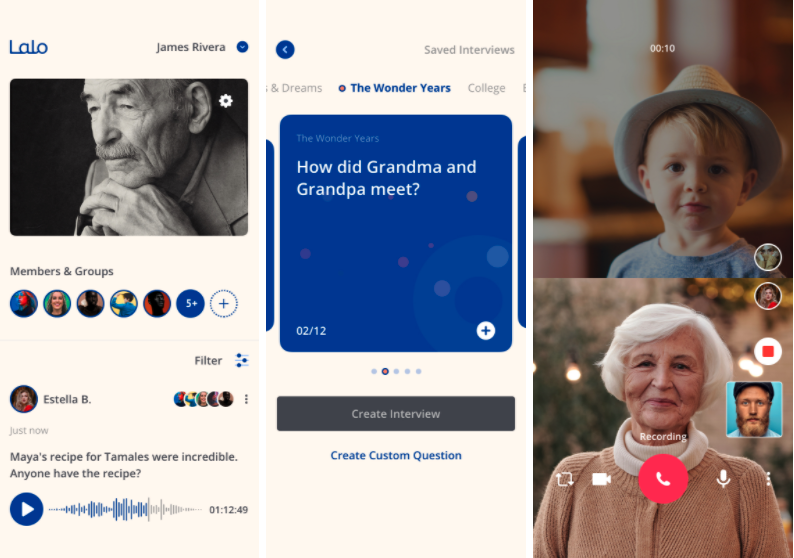(Especially pictures)
Juan Medina first considered the idea for his new startup in 2003 after his father’s death when his wife asked him to tell a story about his father, and Medina realized he hadn’t known him that well. Stories, jokes, recipes, and more were either lost or scattered among various friends and family, Medina said.
The idea resurfaced in recent years when Medina’s own daughter, now 9, said she never really met her grandparents. Medina decided to found his startup Lalo – also his father’s nickname – with the mission of providing people with a private, digital space to connect, share stories and capture precious memories.
Lalo is currently a small, private beta and app that makes it easy to collect digital content like pictures, videos, voice, text, and more. Away from the noise and common pitfalls of traditional social media platforms, groups are intentionally kept small to encourage more trust and privacy. Imagine family members gathering to gather the best recipes in one place or to share pictures that may have been lost in an invisible photo album.
 Lalo founder Juan Medina. (Courtesy photo by Juan Medina)
Lalo founder Juan Medina. (Courtesy photo by Juan Medina)
“It’s a place to hold those more important family memories, the Sunday phone calls from grandchildren to grandparents, where they can say, ‘Grandpa, tell me about a time …” said Medina.
Lalo plans to make money by charging $ 25 a year for a subscription to the ad-free app, which allows multiple people to have access to a room for that price. Medina said the idea was optimized for smaller groups of 10-15 people and too privacy-focused.
“You won’t be pinged by your middle school friend like, ‘Hey, join my account,'” he said.
Medina is also working on ensuring the persistence of the data, possibly with a blockchain solution or other ways to digitally archive the material in the long term. He sees his competitors as traditional social media like Facebook, in which people now exchange pictures and stories, or more story-oriented offers like StoryCorps on NPR or StoryWorth.
The idea follows on from the wave of innovation in the “Death Tech” category, in which startups reinterpret everything to do with traditional practices in the death and funeral industry with ideas such as body composting, cremation and buying caskets.
Lalo users don’t need to focus on a recent or impending loss of a loved one, but Medina believes the app can be a helpful tool in the grieving process.
Before Medina tried his own startup, Medina worked at Amazon for a little over eight years on various technologies, building things from scratch and understanding how to build things quickly. The decision to leave and start Lalo came with some concern.
“I’m married, I have a daughter, we have a mortgage. It was scary to get away from this steady income that I had all my life, ”said Medina. “But it was incredible. I loved it. It was great to do what I love, something that I’m passionate about. “
And the interest of various angel investors, as well as the funding of Lalo’s first institutional investor, have allayed some concerns about the long-term viability of the idea. Columbus, Ohio-based VC firm Overlooked Ventures announced earlier this month that Lalo was their first investment, and founding partner Janine Sickmeyer wrote of the startup, “No technology can alleviate the pain of losing a loved one, but better Having opportunities to grieve can help people come to terms with the loss and stay connected to grieve the loss together. “
Medina did not share how much money Lalo raised for pre-seed funding. The company was founded in late 2020 and relocated in March after Medina left Amazon.
Lalo currently has eight employees and is one of 30 startups selected for the Washington Technology Industry Association’s sixth Founding Cohort Program, announced in August. The plan is to come out of beta in early 2022.
